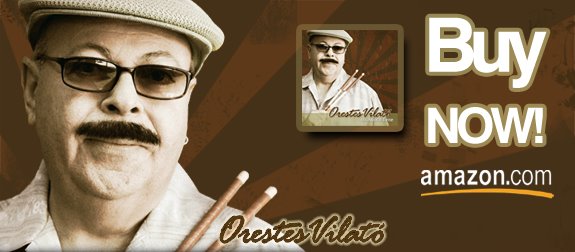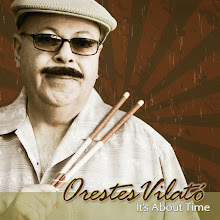lunes, 30 de marzo de 2009
martes, 10 de marzo de 2009
Legendary Cuban Percussionist Releases First Solo Album
Orestes Vilató says It’s About Time came naturally
With the impressive r sum Cuban percussionist Orestes Vilató has built in the music industry over the last 40 years, it would be difficult to find something the Grammy-nominated musician hasnt done.
He has performed with everyone from Celia Cruz to Aretha Franklin to Carlos Santana and is considered one of the pioneers of the East Coast salsa phenomenon. If a band has ever needed someone to play the timbales or other percussion instruments for their Latin or jazz groups, Vilató is usually the name at the top of their lists.
Still, after four decades, there was something musicians and fans wanted Vilató, who is originally from Camaguey, Cuba, to do. Despite being one of the most in-demand percussionists working today, Vilató had never released a solo album.
I had waited so long, it was about time I had dared to do a solo album, Vilató told EXTRA during an interview to promote It’s about Time, a 10-track solo album released by Rafca Records on Feb. 10. I had been busy all these years working for everybody else. A lot of people asked, Why don’t you do it now? I said, OK, let’s do it!
After only two studio sessions, It’s about Time was complete. On the album, Vilató plays a number of classic and celebrated songs, including Las Boinas de Cachao composed by Israel Cachao Lopez, Consulate Como Yo, a neo-classical.
style rumba, and Remembering Ray, a song dedicated to fellow musician and friend Ray Barretto. Vilató even sings for the first time in Olvido, a song he remembers from his childhood in Cuba.
EXTRA: When you decided you finally wanted to record a solo album, did you have an idea of who you wanted to record with you? Were musicians lining up to take part on the project?
Orestes Vilató: I had a few people come to me, but I did have an idea of who I wanted on the album. Since the album was done in L.A. it was an advantage because most of the people lived there. It was like a glove on the right hand. The sound and the concept for the album just fit perfectly.
Did this feel like it was the next step in your career?
It felt natural. We had a lot of fun in the studio. There was a lot of emotion and happiness. It was like a birthday party. Everyone was having a good time and playing from the heart. It was a little different than a regular session. I didn´t have to tell anyone what to do. Everyone knew exactly what to do and it was exactly what I had in mind.
Now that you have finally done a solo album, can you imagine doing another?
Yes, but I don’t know if I want to do the same thing. It’s too early to know. A lot of people think that I’m just a salsa player or a Latin jazz.
Player, but I have played rock n roll and other types of music. Each type of music is natural to me.
Who did you look up to outside the Latin music industry?
I came to the U.S. when I was 12 and in the middle of the rock n roll era. I listened to Elvis Presley and Chuck Berry. I have all that inside me. I have always been a harmonic individual so I listened to a lot of vocalists. The reason I play percussion the way I do is because I play it like it was a different instrument. I play it like a melodic instrument. A lot people think percussionists just hit something and make noise. But its not noise; its sound. So, yes, I did listen to American percussionists, but I listened more to Frank Sinatra and to Nat King Cole.
Fuente
Extra News
Kiko Martinez
With the impressive r sum Cuban percussionist Orestes Vilató has built in the music industry over the last 40 years, it would be difficult to find something the Grammy-nominated musician hasnt done.
He has performed with everyone from Celia Cruz to Aretha Franklin to Carlos Santana and is considered one of the pioneers of the East Coast salsa phenomenon. If a band has ever needed someone to play the timbales or other percussion instruments for their Latin or jazz groups, Vilató is usually the name at the top of their lists.
Still, after four decades, there was something musicians and fans wanted Vilató, who is originally from Camaguey, Cuba, to do. Despite being one of the most in-demand percussionists working today, Vilató had never released a solo album.
I had waited so long, it was about time I had dared to do a solo album, Vilató told EXTRA during an interview to promote It’s about Time, a 10-track solo album released by Rafca Records on Feb. 10. I had been busy all these years working for everybody else. A lot of people asked, Why don’t you do it now? I said, OK, let’s do it!
After only two studio sessions, It’s about Time was complete. On the album, Vilató plays a number of classic and celebrated songs, including Las Boinas de Cachao composed by Israel Cachao Lopez, Consulate Como Yo, a neo-classical.
style rumba, and Remembering Ray, a song dedicated to fellow musician and friend Ray Barretto. Vilató even sings for the first time in Olvido, a song he remembers from his childhood in Cuba.
EXTRA: When you decided you finally wanted to record a solo album, did you have an idea of who you wanted to record with you? Were musicians lining up to take part on the project?
Orestes Vilató: I had a few people come to me, but I did have an idea of who I wanted on the album. Since the album was done in L.A. it was an advantage because most of the people lived there. It was like a glove on the right hand. The sound and the concept for the album just fit perfectly.
Did this feel like it was the next step in your career?
It felt natural. We had a lot of fun in the studio. There was a lot of emotion and happiness. It was like a birthday party. Everyone was having a good time and playing from the heart. It was a little different than a regular session. I didn´t have to tell anyone what to do. Everyone knew exactly what to do and it was exactly what I had in mind.
Now that you have finally done a solo album, can you imagine doing another?
Yes, but I don’t know if I want to do the same thing. It’s too early to know. A lot of people think that I’m just a salsa player or a Latin jazz.
Player, but I have played rock n roll and other types of music. Each type of music is natural to me.
Who did you look up to outside the Latin music industry?
I came to the U.S. when I was 12 and in the middle of the rock n roll era. I listened to Elvis Presley and Chuck Berry. I have all that inside me. I have always been a harmonic individual so I listened to a lot of vocalists. The reason I play percussion the way I do is because I play it like it was a different instrument. I play it like a melodic instrument. A lot people think percussionists just hit something and make noise. But its not noise; its sound. So, yes, I did listen to American percussionists, but I listened more to Frank Sinatra and to Nat King Cole.
Fuente
Extra News
Kiko Martinez
Suscribirse a:
Comentarios (Atom)
.jpg)


